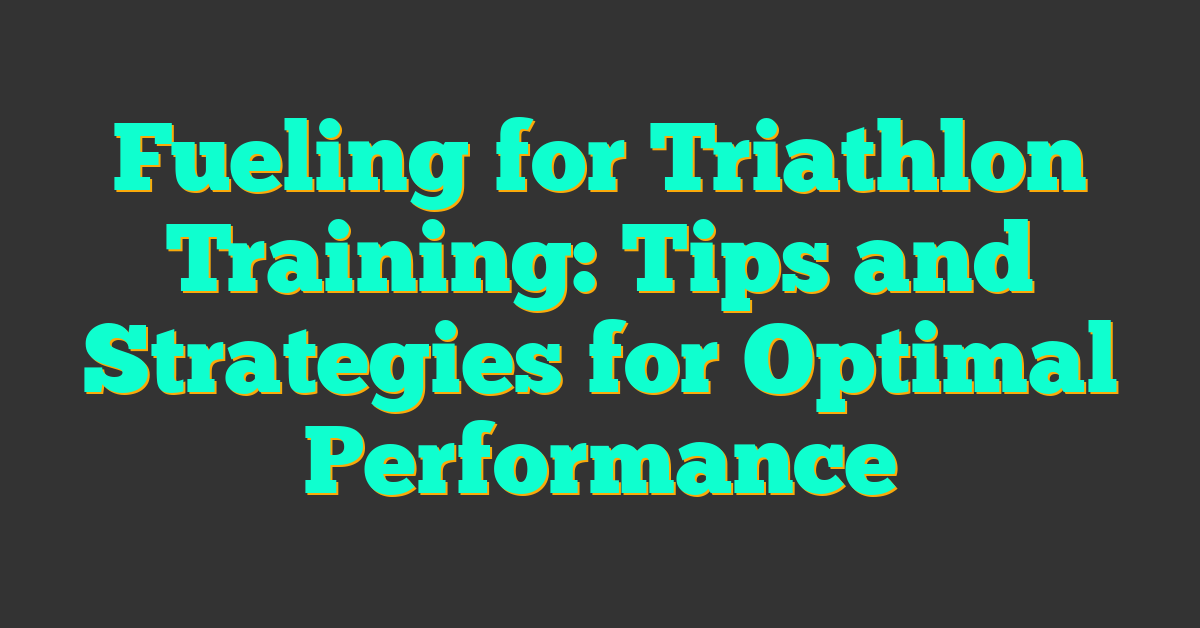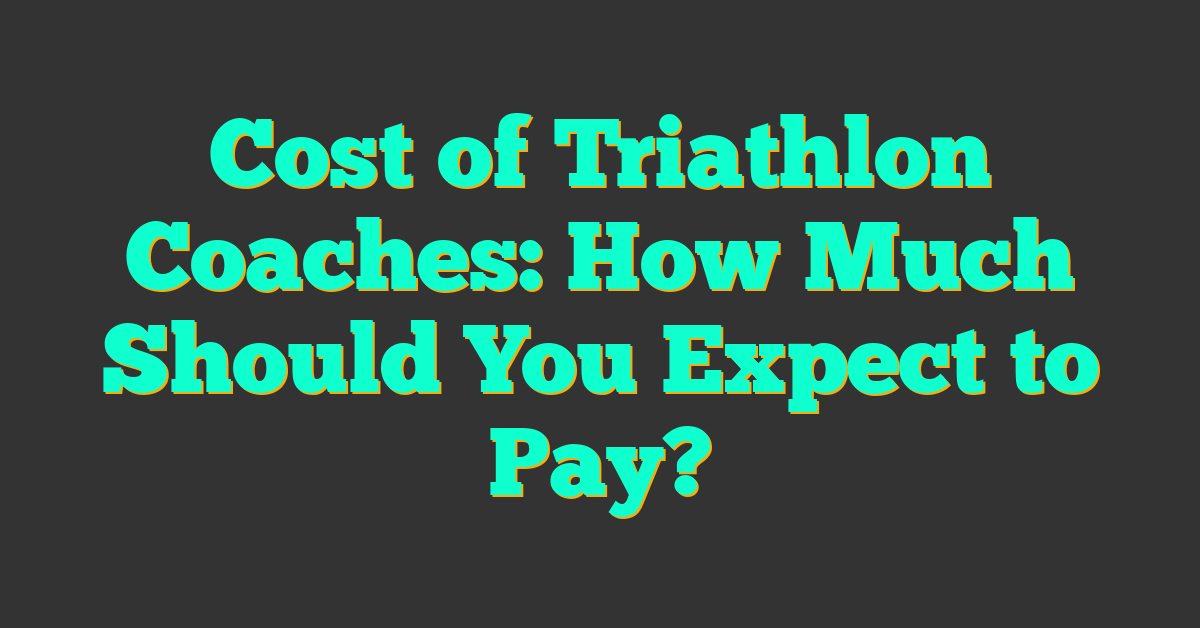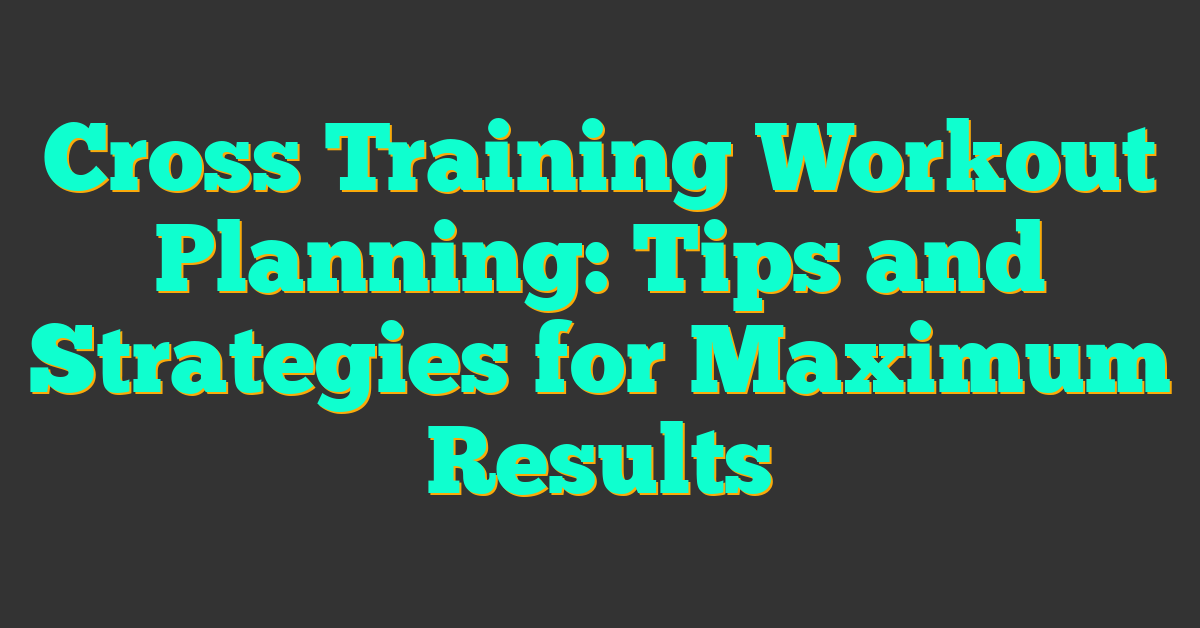Triathlon training is a demanding activity that requires a lot of energy and endurance. To perform well and avoid fatigue, it is essential to fuel your body correctly. Proper fueling can help you maintain your energy levels, improve your performance, and recover faster after workouts.

Understanding the Basics of Triathlon Fueling is the first step in developing a successful fueling plan. You should know what your body needs to perform well, including the right balance of macronutrients and hydration. Macronutrients play a crucial role in training, providing your body with the energy it needs to perform at its best. Hydration is also essential, as it helps regulate body temperature, lubricate joints, and transport nutrients to your muscles.
Pre-, During, and Post-Workout Nutrition are also important factors to consider when developing a fueling plan. You need to fuel your body before a workout to provide it with the energy it needs to perform well. During your workout, you need to maintain your energy levels by consuming the right amount of carbohydrates and fluids. After your workout, you need to refuel your body to help it recover and prepare for the next workout.
Key Takeaways
- Understanding the basics of triathlon fueling is essential for developing a successful fueling plan.
- Pre-, during, and post-workout nutrition are important factors to consider when fueling for triathlon training.
- Personalizing your fueling plan is crucial to meet your individual needs and goals.
Understanding the Basics of Triathlon Fueling
https://www.youtube.com/watch?v=oOPBxfyW8BE&embed=true

Fueling for triathlon training is a crucial aspect of your performance. Proper nutrition and hydration can help you maintain your energy levels and sustain your stamina throughout the race. Here are some basic concepts you should understand to fuel your body for triathlon training.
Nutrition
Nutrition is an essential aspect of triathlon training. Your body needs a balanced diet of carbohydrates, protein, and fats to fuel your muscles and provide energy for your workouts. Carbohydrates are the primary source of energy for your muscles, while protein helps repair and rebuild your muscles after exercise. Fats provide a long-lasting source of energy for your body.
Hydration
Hydration is critical for triathlon training. Your body needs water to regulate your body temperature, transport nutrients to your muscles, and remove waste products. Electrolytes such as sodium, potassium, and magnesium are also essential for hydration, as they help regulate fluid balance in your body.
Carbohydrates
Carbohydrates are the primary source of energy for your muscles during exercise. Your body stores carbohydrates in the form of glycogen in your muscles and liver. During exercise, your body breaks down glycogen to provide energy for your muscles. It is essential to consume enough carbohydrates before and during exercise to maintain your energy levels.
Protein
Protein is essential for muscle repair and recovery after exercise. Consuming protein after exercise can help your muscles recover faster and reduce muscle soreness. It is also essential to consume enough protein throughout the day to support muscle growth and repair.
Fats
Fats provide a long-lasting source of energy for your body during exercise. Your body stores fat in adipose tissue, and during exercise, your body breaks down fat to provide energy for your muscles. It is essential to consume enough healthy fats in your diet to support your body’s energy needs.
Electrolytes
Electrolytes such as sodium, potassium, and magnesium are essential for hydration and fluid balance in your body. During exercise, your body loses electrolytes through sweat, and it is essential to replenish them to maintain your body’s fluid balance.
By understanding the basics of triathlon fueling, you can fuel your body properly for triathlon training and optimize your performance.
Macronutrients and Their Role in Training
https://www.youtube.com/watch?v=sj5_rNKvQPM&embed=true
When it comes to triathlon training, it’s essential to fuel your body with the right macronutrients to support your energy, muscle repair, and endurance. Macronutrients are the nutrients that your body needs in large amounts, and they include carbohydrates, proteins, and fats. In this section, we’ll discuss the role of each macronutrient in triathlon training.
Carbohydrates for Energy
Carbohydrates are the primary source of energy for your body during exercise. They are broken down into glucose, which is used by your muscles as fuel. During triathlon training, it’s essential to consume enough carbohydrates to maintain your energy levels and prevent fatigue.
Good sources of carbohydrates include fruits, vegetables, whole grains, and legumes. It’s recommended that you consume between 3-5 grams of carbohydrates per pound of body weight per day, depending on your training volume and intensity 1. It’s also important to consume carbohydrates before and after exercise to replenish your glycogen stores and support muscle recovery.
Proteins for Muscle Repair
Proteins are essential for muscle repair and recovery. During triathlon training, your muscles undergo significant stress, and consuming enough protein is crucial for repairing and rebuilding muscle tissue.
Good sources of protein include lean meats, fish, eggs, dairy products, and plant-based sources such as tofu, beans, and lentils. It’s recommended that you consume between 0.5-0.8 grams of protein per pound of body weight per day, depending on your training volume and intensity 2.
Fats for Endurance
Fats are an essential source of energy for endurance exercise. During triathlon training, your body uses fat as fuel during low-intensity exercise, and consuming enough healthy fats is crucial for maintaining endurance.
Good sources of healthy fats include nuts, seeds, avocados, fatty fish, and olive oil. It’s recommended that you consume between 20-35% of your daily calories from fat, depending on your training volume and intensity 3.
In summary, consuming the right macronutrients is crucial for supporting your energy, muscle repair, and endurance during triathlon training. Be sure to consume enough carbohydrates, protein, and healthy fats to fuel your body and support your training goals.
References:
- Fueling the Triathlete: Evidence-Based Practical Advice for Endurance Athletes
- Triathlete’s Complete Guide to Nutrition and Fueling
- Triathlon nutrition – our ultimate guide to fuelling
Hydration Strategies for Triathletes
« 25 Tips on How to Go From Overweight to Triathlete
Garmin Fenix vs Forerunner: Which GPS Watch is Best for You? »
https://www.youtube.com/watch?v=B4RV47o4ApM&embed=true
As a triathlete, staying hydrated is crucial for optimal performance. Proper hydration helps regulate your body temperature, lubricate your joints, and transport nutrients to your muscles. Here are some hydration strategies to keep in mind during your training:
Fluid Intake Before, During, and After Training
Before training, it’s important to drink enough fluids to ensure you start your workout hydrated. Aim to drink about 17-20 ounces of water 2-3 hours before training and another 8 ounces 20-30 minutes before training. During training, you should aim to drink fluids every 10-20 minutes, depending on the intensity of your workout and the temperature and humidity of your environment. A general guideline is to drink 7-10 ounces of fluid every 10-20 minutes. After training, it’s important to replenish fluids lost during exercise. Aim to drink 16-24 ounces of fluid for every pound of body weight lost during exercise.
Electrolyte Balance
Electrolytes are minerals in your body that help regulate fluid balance, muscle contractions, and nerve function. When you sweat, you lose electrolytes, which can lead to dehydration and muscle cramping. To maintain electrolyte balance, it’s important to drink fluids that contain electrolytes, such as sodium and potassium. You can also replenish electrolytes through food sources, such as bananas, avocados, and sweet potatoes. It’s important to note that consuming too much water without enough electrolytes can lead to hyponatremia, a condition where your blood sodium levels are too low. To avoid this, aim to consume fluids that contain electrolytes during and after training.
By keeping these hydration strategies in mind, you can ensure that you stay hydrated and perform at your best during your triathlon training. Remember to listen to your body and drink fluids when you’re thirsty.
Pre-, During, and Post-Workout Nutrition
https://www.youtube.com/watch?v=EMz-tCmfqos&embed=true
As a triathlete, you know that proper nutrition is key to achieving your goals. Whether you’re training for a race or just trying to stay in shape, what you eat before, during, and after your workouts can have a big impact on your performance and recovery. In this section, we’ll cover the basics of pre-, during, and post-workout nutrition to help you fuel your body and achieve your best results.
Pre-Workout Fueling
Your pre-workout meal should be eaten 1-2 hours before your workout and should consist of foods that are easy to digest and give you sustained energy. Some great options include oatmeal, toast with peanut butter, or a banana. If you’re working out first thing in the morning, have a small breakfast like a yogurt or piece of fruit. It’s important to experiment with different types, quantities, and timing of food during your training sessions to find what works best for you.
In-Training Nutrition
During your training sessions, it’s important to stay fueled and hydrated. Depending on the timing of the workout, proper fueling could reduce the risk of overeating later in the day. Aim to consume 15-30g of carbohydrates + 5-10g protein 30-60 minutes before the workout. Drink 8-12 ounces of water and enjoy 30-60 minutes of recovery nutrition after the workout. Energy gels and sports drinks can also be used as a quick source of fuel during long workouts.
Recovery Nutrition
After your workout, your body needs to refuel and recover. Eating properly after exercise can help you work at a higher intensity for longer, resulting in greater performance gains in the long run. Within 30 minutes of finishing your workout, aim to consume a snack or meal that contains both carbohydrates and protein. Some great options include a protein shake, Greek yogurt with fruit, or a turkey sandwich on whole grain bread. It’s important to experiment with different types of recovery nutrition to find what works best for you.
In conclusion, proper nutrition is key to achieving your goals as a triathlete. By fueling your body with the right foods at the right times, you can optimize your performance and recovery. Remember to experiment with different types of fueling and recovery nutrition to find what works best for you.
Personalizing Your Fueling Plan
https://www.youtube.com/watch?v=HCz_-BzCd-E&embed=true
Fueling for triathlon training is not a one-size-fits-all approach. Everyone has different nutritional needs and requirements based on their training intensity, distance, and individual energy needs. By personalizing your fueling plan, you can optimize your performance and achieve your goals.
Assessing Individual Energy Needs
The first step in personalizing your fueling plan is to assess your individual energy needs. This includes determining your daily caloric intake, macronutrient distribution, and hydration requirements. A registered dietitian can help you determine your individual energy needs and create a customized nutrition plan based on your training schedule and goals.
Adapting to Training Intensity and Distance
As you progress through your training, your nutritional needs will change based on the intensity and duration of your workouts. For sprint distance triathlons, you may not need as many calories as you would for a longer race, such as a 70.3 distance triathlon. It is important to adapt your fueling plan to meet the demands of your training.
One way to do this is to use a fueling calculator, such as Fuelin + MyProCoach. This tool allows you to receive personalized guidance on in-session fueling for training sessions based on the session type, duration, and intensity. Your daily fueling plan is customized based on your training, and you can connect it to your training plan or add sessions manually.
In summary, personalizing your fueling plan is essential for optimizing your performance during triathlon training. Assessing your individual energy needs and adapting to training intensity and distance are key components of a successful fueling plan. Use tools like Fuelin + MyProCoach to help you create a customized nutrition plan that will help you achieve your goals.
Frequently Asked Questions

What should a beginner’s meal plan for triathlon training include?
As a beginner, it’s important to focus on a balanced diet that includes a variety of nutrient-dense foods. Your meal plan should include a mix of carbohydrates, proteins, and healthy fats. Good carbohydrate sources include fruits, vegetables, whole grains, and legumes. Lean proteins like chicken, fish, and tofu are great options, and healthy fats can be found in foods like avocados, nuts, and seeds. It’s also important to stay hydrated by drinking plenty of water throughout the day.
What’s the best way to fuel during triathlon training?
The best way to fuel during triathlon training is to consume a mix of carbohydrates and electrolytes. Good carbohydrate sources include sports drinks, gels, and energy bars. Electrolytes can be found in sports drinks or in electrolyte tablets that can be added to your water. It’s important to experiment with different fueling strategies during training to find what works best for you.
How can I find a good triathlon diet plan?
You can find a good triathlon diet plan by consulting with a registered dietitian or sports nutritionist. They can help you create a personalized meal plan that takes into account your training schedule, body composition, and individual needs. You can also find sample meal plans online, but be sure to choose ones from reputable sources.
What are ideal breakfast options before participating in a triathlon?
Ideal breakfast options before participating in a triathlon include foods that are high in carbohydrates and easy to digest. Good options include oatmeal with fruit, a bagel with peanut butter, or a smoothie made with fruit and yogurt. It’s important to eat your breakfast at least two hours before your race or training session to allow time for digestion.
How many calories are recommended daily for someone training for a triathlon?
The number of calories recommended daily for someone training for a triathlon will vary depending on their individual needs and training schedule. However, as a general guideline, most triathletes should aim to consume between 2,000 and 3,000 calories per day, with a focus on nutrient-dense foods.
What’s the recommended protein intake for triathlon training?
The recommended protein intake for triathlon training is between 1.2 and 1.7 grams of protein per kilogram of body weight per day. This means that a 150-pound triathlete should aim to consume between 82 and 116 grams of protein per day. Good sources of protein include lean meats, fish, eggs, dairy products, and plant-based sources like beans and tofu.





![Lamicall Bike Frame Bag Waterproof - [1s Release] [2 in](https://m.media-amazon.com/images/I/41WyOmmNsYL._SL500_.jpg)




